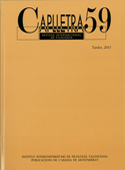Shifting of meaning as a creative resource: Chromatic Neology
DOI:
https://doi.org/10.7203/caplletra.59.6906Keywords:
neology, shifting of meaning, semantic change, colours, metaphor, metonymy, cognitive linguistics Abstract
Abstract
Abstract: Colour words have symbolic meanings, which have been acquired over the years and through different cultures. This is why «colour» words are widely used to create new lexical units. In this article, the authors analyse an aspect of the names of colours that is relatively unstudied: their role in the shifting of meaning of a language’s new lexical units. This linguistic study is based on fundamental linguistic anthropology concepts and also on the theoretical assumptions of Cognitive Semantics. After establishing fundamental notions, the study analyses a corpus of lexicographical polylexical neologisms containing a colour word. It focuses on the analysis of those units that include the word «green». The authors’ objective is to determine the semantic mechanisms and conceptual relationships that have generated new meanings of colour words or containing a colour word.
Key words: neology, shifting of meaning, semantic change, colours, metaphor, metonymy, cognitive linguistics.
 Downloads
Downloads
Downloads
Published
How to Cite
-
Abstract1082
-
PDF (Català)646
Issue
Section
License
Authors submitting work to Caplletra for publication must be the legitimate holder of the usage rights. Legitimacy for the purposes of publishing the work must also include images, tables, diagrams and any other materials that may complement the text, whether they are the author of such material or not.
Copyright: on publishing their work in the journal, the author grants Caplletra. Revista Internacional de Filologia usage rights (reproduction, distribution and public communication) for both the paper printed version and for the electronic version.
All work published in Caplletra is covered by the Creative Commons license type Attribution-NonCommercial-NoDerivatives 4.0 (CC BY-NC-ND 4.0).
RESPONSABILITY
Caplletra. Revista Internacional de Filologia does not necessarily identify with the points of view expressed in the papers it publishes.
Caplletra. Revista Internacional de Filologia accepts no responsibility whatsoever for any eventual infringement of intellectual property rights on the part of authors.






